英语专业毕业论文提纲
毕业论文英语专业范文
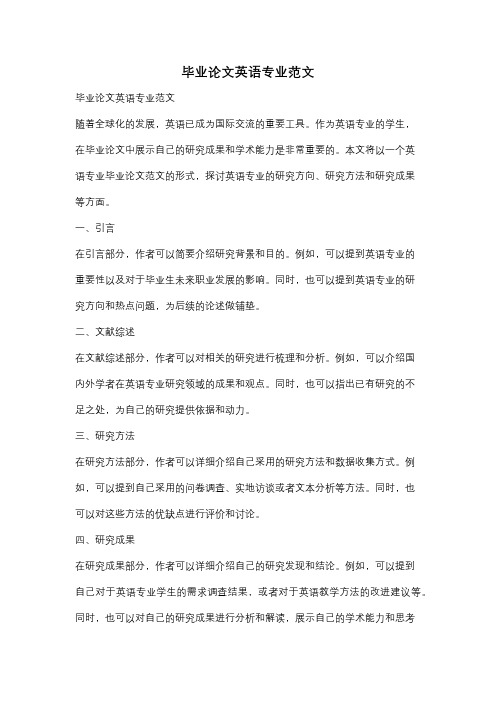
毕业论文英语专业范文毕业论文英语专业范文随着全球化的发展,英语已成为国际交流的重要工具。
作为英语专业的学生,在毕业论文中展示自己的研究成果和学术能力是非常重要的。
本文将以一个英语专业毕业论文范文的形式,探讨英语专业的研究方向、研究方法和研究成果等方面。
一、引言在引言部分,作者可以简要介绍研究背景和目的。
例如,可以提到英语专业的重要性以及对于毕业生未来职业发展的影响。
同时,也可以提到英语专业的研究方向和热点问题,为后续的论述做铺垫。
二、文献综述在文献综述部分,作者可以对相关的研究进行梳理和分析。
例如,可以介绍国内外学者在英语专业研究领域的成果和观点。
同时,也可以指出已有研究的不足之处,为自己的研究提供依据和动力。
三、研究方法在研究方法部分,作者可以详细介绍自己采用的研究方法和数据收集方式。
例如,可以提到自己采用的问卷调查、实地访谈或者文本分析等方法。
同时,也可以对这些方法的优缺点进行评价和讨论。
四、研究成果在研究成果部分,作者可以详细介绍自己的研究发现和结论。
例如,可以提到自己对于英语专业学生的需求调查结果,或者对于英语教学方法的改进建议等。
同时,也可以对自己的研究成果进行分析和解读,展示自己的学术能力和思考深度。
五、讨论与展望在讨论与展望部分,作者可以对自己的研究成果进行讨论和评价。
例如,可以指出自己的研究结果与已有研究的一致性或者差异性。
同时,也可以对自己的研究方法和数据分析进行反思和总结,提出进一步研究的方向和建议。
六、结论在结论部分,作者可以对全文进行总结和回顾。
例如,可以简要概括自己的研究目的、方法和成果。
同时,也可以强调自己的研究对于英语专业的意义和价值。
七、参考文献在参考文献部分,作者可以列举自己在研究过程中参考的文献和资料。
同时,也可以按照学术规范对这些文献进行格式化的引用。
总结:本文以一个英语专业毕业论文范文的形式,探讨了英语专业的研究方向、研究方法和研究成果等方面。
通过引言、文献综述、研究方法、研究成果、讨论与展望和结论等部分的论述,作者对英语专业的研究做了全面而深入的探讨。
关于英语专业毕业论文提纲优质范文.doc

英语专业毕业论文提纲范文一、英语谚语的概述1.1.对谚语的一般定义,并概括英语谚语的基本特点(3—5条)1.2.结合谚语与语言的关系,简要论述英语谚语来源的一般性概述这一部分大体写2000字。
二、西方的宗教传统与英语谚语的本源关联2.1对基督教的历史做一简单的概述,同时对《圣经》对基督教的核心意义与价值做一简单的说明2.1.1. 简述西方的宗教传统,或者基督教的历史2.1.2. 对基督教的基本信义做一简单的概述,从下述几个方面:(1)对基督教的只信仰一个唯一的上帝,不容许进行偶像崇拜;(2)原罪的观念与救赎的观念:涉及末世审判、救赎恩典和得救的观念(3)爱是基督教信仰的核心,核心是爱上帝,同时爱每个人归根结底,基督教是一种高级的精神性宗教,深深地浸透入了西方世界的每一个角落2.2英语谚语与基督教的关系,特别是《圣经》的英译对英语的影响(1)《圣经》历史上的英译本,主要讲钦定本的诞生和影响(譬如扩大了英语的词汇量、增强了英语的表意功能、增加了英语的表意手段等等)(2)通过一些简单的例证来说明从拉丁语翻译到英语这一过程的影响与意义(如可以举例一些特殊的词语、句式等说明,做好这一部分关键是找到好的研究资料)三、对源于《圣经》的谚语进行分析,揭示其宗教、文化内涵(选取若干源于《圣经》的谚语进行具体的、细致的分析,以揭示谚语背后的宗教内涵和英语所负载的宗教文化意义。
)1.选取15—20条有代表性的谚语进行分析,(1)简述一下选取分析对象的标准首先这些谚语必须来源于《圣经》或者有《圣经》直接引伸出来,其次这些谚语必须是应用较广,家喻户晓,且包含特定的智慧(2)对这些谚语进行分析我们的分析角度或方法是:1、要将这些谚语放到《圣经》的文本中去,也就是要将其放回到具体的语境中,在具体的故事或圣经人物的言说中领会这些谚语的内涵2、可以适当的结合这些谚语的修辞、句式结构等来分析2.对上述谚语分析之后,从若干角度进行文化内涵的总结和概括这些谚语的内在价值:道德规范、人生智慧、这些谚语的功能:宗教教化功能、规导劝慰功能、(这些价值功能关键的根据所选谚语的分析来确定,有新的发现可适当再添加)这一部分为本文的主体部分,在3500字左右附:拟订提纲的步骤与方法第一步,明确文章的大小题目。
英语专业毕业论文初稿

英语专业毕业论文初稿第一篇:英语专业毕业论文初稿Comparison of Family Education between China and theUSATable of ContentsAbstract in English-----------------1 Key words in English-------------1 Abstract in Chinese---------------1 Key words in Chinese-------------1 Ⅰ.Introduction---------------------2 Ⅱ.Differences of Family education in China and the USA--21.Family Education in China------22.Family Education in the USA-33.Our attitudes---------------------3 Ⅲ.Conclusion----------------------8 Bibliography------------------------9共6页,1000字AbstractBecause of the historical background, cultural and other differences, so the United States education in the family there is a great difference.Americans pay attention to cultivating the ability of the child's independence and awareness, and the parents of the Chinese habit of planning everything for their children, their children to act in accordance with the plans and do things behave.We should correctly understand and learn from foreign advanced educational methods, to learn the benefits of family education in the West, combined with family education in China in the past, as soon as possible to find a new, more suitable for a good Chinese education.Keywords:family education, independence , differences摘要由于历史背景,文化等的差异,所以中美在家庭教育方面存在着很大差异。
英语专业毕业论文(纯英文)
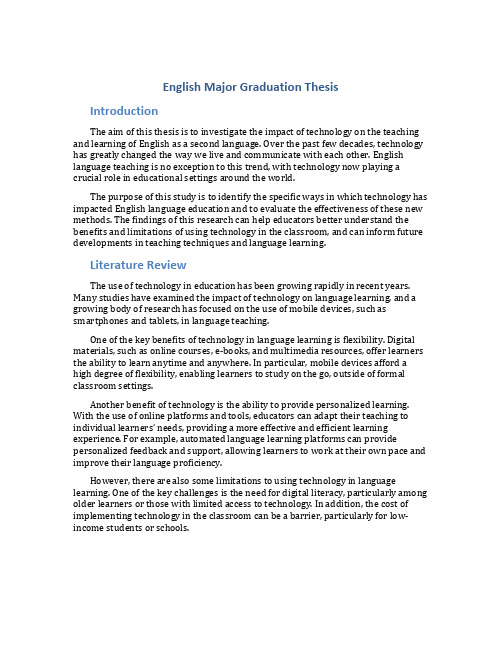
English Major Graduation ThesisIntroductionThe aim of this thesis is to investigate the impact of technology on the teaching and learning of English as a second language. Over the past few decades, technology has greatly changed the way we live and communicate with each other. English language teaching is no exception to this trend, with technology now playing a crucial role in educational settings around the world.The purpose of this study is to identify the specific ways in which technology has impacted English language education and to evaluate the effectiveness of these new methods. The findings of this research can help educators better understand the benefits and limitations of using technology in the classroom, and can inform future developments in teaching techniques and language learning.Literature ReviewThe use of technology in education has been growing rapidly in recent years. Many studies have examined the impact of technology on language learning, and a growing body of research has focused on the use of mobile devices, such as smartphones and tablets, in language teaching.One of the key benefits of technology in language learning is flexibility. Digital materials, such as online courses, e-books, and multimedia resources, offer learners the ability to learn anytime and anywhere. In particular, mobile devices afford a high degree of flexibility, enabling learners to study on the go, outside of formal classroom settings.Another benefit of technology is the ability to provide personalized learning. With the use of online platforms and tools, educators can adapt their teaching to individual learners’ needs, providing a more effective and efficient learning experience. For example, automated language learning platforms can provide personalized feedback and support, allowing learners to work at their own pace and improve their language proficiency.However, there are also some limitations to using technology in language learning. One of the key challenges is the need for digital literacy, particularly among older learners or those with limited access to technology. In addition, the cost of implementing technology in the classroom can be a barrier, particularly for low-income students or schools.Research MethodologyTo investigate the impact of technology on English language teaching and learning, this study employs a mixed-methods research approach. This includes both qualitative and quantitative data collection and analysis.The qualitative component of the study involves semi-structured interviews with English language educators and learners, as well as classroom observations and analysis of digital materials used in teaching. The quantitative component includes a survey of English language learners, involving both open-ended and closed-ended questions.Data analysis will involve both coding of qualitative data and statistical analysis of the survey data. The study will also include a comparative analysis of the effectiveness of traditional teaching methods versus technology-enhanced teaching methods.ConclusionThe growing use of technology in education and the increasing demand for English language proficiency have made it essential to understand the impact of technology on English language teaching and learning. This study aims to provide insights into the effectiveness of technology in language education, identify the benefits and challenges of using technology, and inform future developments in language teaching techniques.The findings of this research can be used by educators and policy-makers to improve the quality and accessibility of English language education, particularly in countries where English is not the primary language. By understanding the potential of technology in language learning, educators can create more effective and efficient teaching methods that meet the needs of learners in the 21st century.。
商务英语毕业论文提纲
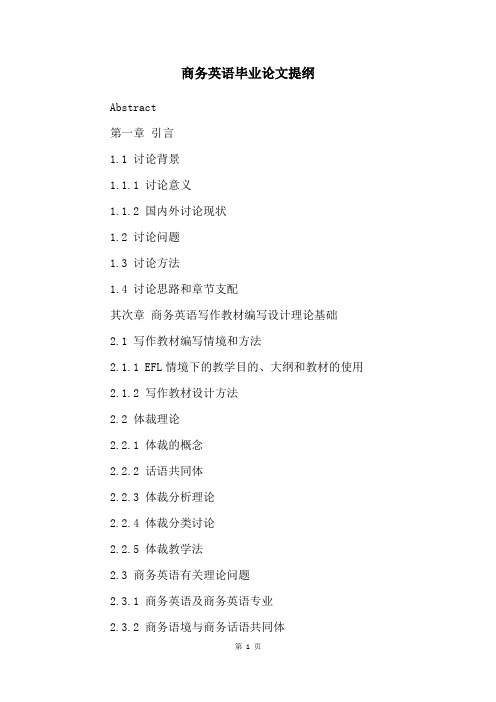
商务英语毕业论文提纲Abstract第一章引言1.1 讨论背景1.1.1 讨论意义1.1.2 国内外讨论现状1.2 讨论问题1.3 讨论方法1.4 讨论思路和章节支配其次章商务英语写作教材编写设计理论基础2.1 写作教材编写情境和方法2.1.1 EFL情境下的教学目的、大纲和教材的使用 2.1.2 写作教材设计方法2.2 体裁理论2.2.1 体裁的概念2.2.2 话语共同体2.2.3 体裁分析理论2.2.4 体裁分类讨论2.2.5 体裁教学法2.3 商务英语有关理论问题2.3.1 商务英语及商务英语专业2.3.2 商务语境与商务话语共同体2.3.3 商务英语写作教学理论2.3.4 商务英语体裁写作的内涵与特征小结第三章商务英语写作教材与商务英语写作现状调查分析 3.1 商务英语写作教材回顾3.2 商务英语写作教材调查3.2.1 国外主要商务英语写作教材状况3.2.2 国内主要商务英语写作教材状况3.2.3 国内商务英语写作教材编写特点3.2.4 国内商务英语写作教材编写存在的.问题3.3 国内商务英语写作教材使用状况调查3.3.1 问卷调查3.3.2 访谈调查3.3.3 调查结果分析3.4 国内商务英语写作状况调查3.4.1 调查对象及方法3.4.2 调查结果分析第四章体裁理论在商务英语写作教材编写中的应用4.1 现有商务英语写作教材的改良思路4.1.1 基于需求分析的教学大纲和教材编写4.1.2 建立专用语料库4.1.3 立体化教材编写4.1.4 将体裁理论应用于教材的设计和编写4.2 体裁理论下的商务英语写作教学设计4.2.1 基于体裁理论的商务英语写作教学过程4.2.2 基于体裁理论的CALL写作教学设计4.3 基于体裁理论的商务英语写作教材编写设计 4.3.1 以体裁概念为核心的编写模式4.3.2 体裁分析在商务英语写作教材编写中的应用 4.4 基于体裁理论的商务英语写作教材内容设计 4.4.1 基于学习者的商务英语写作体裁力量4.4.2 语言方面内容4.4.3 非语言方面内容4.4.4 商务写作教材中的体裁种类第五章结论5.1 本讨论的总结5.2 本论文的创新点5.3 缺乏之处和尚待讨论的问题。
英语专业大学毕业论文
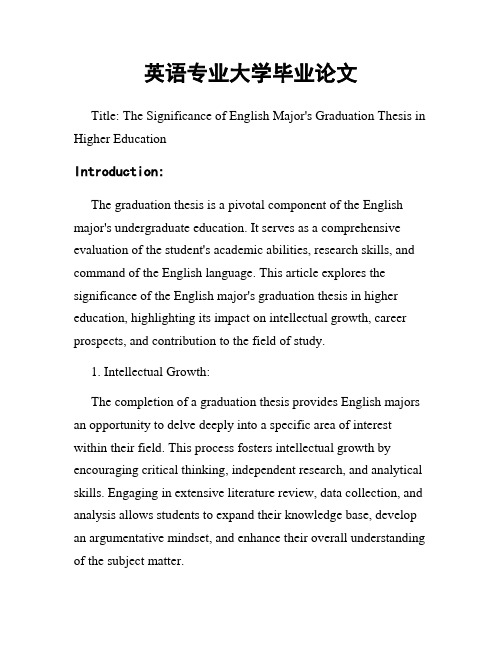
英语专业大学毕业论文Title: The Significance of English Major's Graduation Thesis in Higher EducationIntroduction:The graduation thesis is a pivotal component of the English major's undergraduate education. It serves as a comprehensive evaluation of the student's academic abilities, research skills, and command of the English language. This article explores the significance of the English major's graduation thesis in higher education, highlighting its impact on intellectual growth, career prospects, and contribution to the field of study.1. Intellectual Growth:The completion of a graduation thesis provides English majors an opportunity to delve deeply into a specific area of interest within their field. This process fosters intellectual growth by encouraging critical thinking, independent research, and analytical skills. Engaging in extensive literature review, data collection, and analysis allows students to expand their knowledge base, develop an argumentative mindset, and enhance their overall understanding of the subject matter.2. Research Skills:The graduation thesis requires English majors to conduct extensive research, enabling them to develop and refine their research skills. Through the process of selecting a research topic, formulating research questions, and designing appropriate research methodologies, students learn to critically evaluate existing literature, organize their thoughts, and conduct effective data collection. These skills are crucial for future academic pursuits or professional careers that rely heavily on research and analysis.3. Language Proficiency:Writing the graduation thesis in English not only exhibits a student's language proficiency but also further develops their command of the language. Researching, organizing, and presenting ideas in a coherent and logical manner contributes to strengthening written communication skills. Moreover, the revision and proofreading process helps to refine grammar, punctuation, and vocabulary, leading to enhanced language abilities. This comprehensive language training will greatly benefit students when pursuing higher degrees or when applying for jobs that demand strong communication skills.4. Career Prospects:The graduation thesis plays a crucial role in shaping the career prospects of English majors. Completing a thesis demonstrates the ability to work independently, conduct research, and produce a significant piece of scholarly writing. Employers in various fields recognize the value of these skills, making English majors highly sought after in diverse job markets. The thesis serves as tangible evidence of the student's intellectual capabilities and commitment to academic excellence, significantly enhancing their competitiveness in the job market.5. Contribution to the Field:English major graduation theses contribute to the overall development and advancement of the field of study. Through their research, students often generate new insights, challenge existing theories, and propose innovative ideas. As they expand the boundaries of knowledge within the discipline, their work can serve as a foundation for future studies. By sharing their findings in academic conferences or publishing their work in respected journals, English majors actively contribute to the advancement of the field.Conclusion:The English major's graduation thesis is a vital component of higher education, fostering intellectual growth, honing researchskills, enhancing language proficiency, and establishing promising career prospects. It serves as a culmination of the student's undergraduate journey, reflecting their dedication, skills, and academic achievements. Furthermore, its contribution to the field of study cannot be overstated, as students become active participants in the pursuit of knowledge. The graduation thesis is indeed a significant milestone for English majors, shaping their academic and professional lives.。
英语专业毕业论文大纲
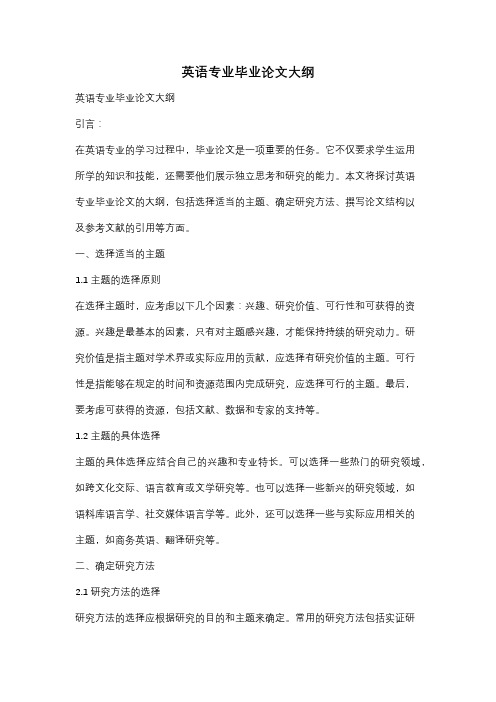
英语专业毕业论文大纲英语专业毕业论文大纲引言:在英语专业的学习过程中,毕业论文是一项重要的任务。
它不仅要求学生运用所学的知识和技能,还需要他们展示独立思考和研究的能力。
本文将探讨英语专业毕业论文的大纲,包括选择适当的主题、确定研究方法、撰写论文结构以及参考文献的引用等方面。
一、选择适当的主题1.1 主题的选择原则在选择主题时,应考虑以下几个因素:兴趣、研究价值、可行性和可获得的资源。
兴趣是最基本的因素,只有对主题感兴趣,才能保持持续的研究动力。
研究价值是指主题对学术界或实际应用的贡献,应选择有研究价值的主题。
可行性是指能够在规定的时间和资源范围内完成研究,应选择可行的主题。
最后,要考虑可获得的资源,包括文献、数据和专家的支持等。
1.2 主题的具体选择主题的具体选择应结合自己的兴趣和专业特长。
可以选择一些热门的研究领域,如跨文化交际、语言教育或文学研究等。
也可以选择一些新兴的研究领域,如语料库语言学、社交媒体语言学等。
此外,还可以选择一些与实际应用相关的主题,如商务英语、翻译研究等。
二、确定研究方法2.1 研究方法的选择研究方法的选择应根据研究的目的和主题来确定。
常用的研究方法包括实证研究、文献综述、案例研究和问卷调查等。
实证研究是通过实际观察和实验来验证假设或推断的方法;文献综述是通过对已有文献进行综合分析和总结来回答研究问题;案例研究是通过对具体案例的深入研究来揭示一般规律;问卷调查是通过设计问卷并对受访者进行调查来收集数据。
2.2 数据的收集和分析根据研究方法的选择,需要采集相应的数据,并进行分析。
数据的收集可以通过实地调研、访谈、问卷调查、文献查阅等方式进行。
数据的分析可以采用定性分析和定量分析两种方法。
定性分析是通过对数据进行分类、整理和归纳来获取结论;定量分析是通过数学和统计方法对数据进行计算和分析来获取结论。
三、撰写论文结构3.1 论文的结构论文的结构一般包括引言、文献综述、研究方法、研究结果、讨论和结论等部分。
英语专业毕业论文写作教学大纲简介

*
教学方法及评估标准
01
课堂面授、课堂讨论、网络资源利用和互动
教学方法:
02
课堂出勤率8%,平时作业及课内外互动22%,毕业论文70%
教学评估:
03
< 60(不及格);60-69(及格);70-84(中等);85-92(良好);93-100(优秀)
评分标准:
*
毕业论文的基本概念
论文(Thesis) 选题(Subject) 论题(Thesis ) 主题(Theme) 话题(Topic) 提纲(Outline) 题目(Title)
*
《英语专业毕业论文写作》 教学大纲简介
第一讲:概念与要求 2011年2月23日
汇报人姓名
教学目的
了解英语专业毕业论文的基本要求
了解英语论文写作的不同过程
了解、掌握英语论文的选题和开题
了解、掌握英语论文的撰写规范
了解英语论文的评价标准
完成一篇5000字符合规范要求的英语毕业论文
01
03
02
04
05
选方向(Select a subject)
2
定题目(Choose a topic)
拟提纲(Write an outline) Weeks 2~3
写初稿(Draft) Weeks 5~7; 8~10; 11~13
复修改(Revise according to adviser)
定终稿(Finalize official copy) Week 14
*
语 言 学 语言与文化
语法(Grammar) 句法(Syntax) 词汇(Idioms, proverbs, prepositions, slangs, euphemism, net language) 比较(Languages)
《英语专业 毕业论文》教学大纲
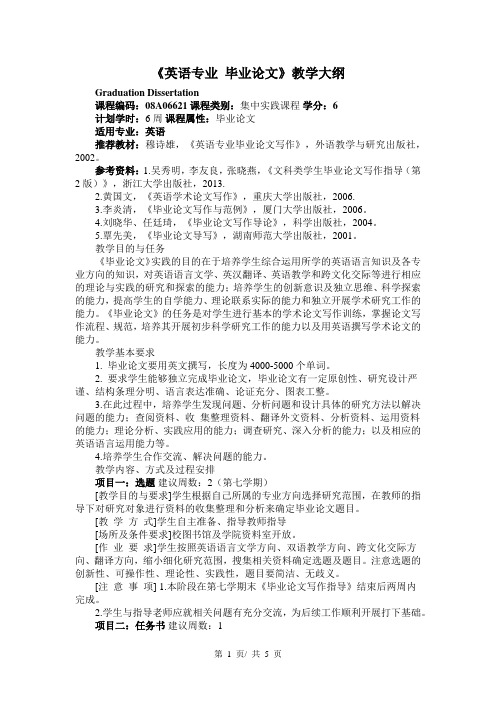
《英语专业毕业论文》教学大纲Graduation Dissertation课程编码:08A06621课程类别:集中实践课程学分:6计划学时:6周课程属性:毕业论文适用专业:英语推荐教材:穆诗雄,《英语专业毕业论文写作》,外语教学与研究出版社,2002。
参考资料:1.吴秀明,李友良,张晓燕,《文科类学生毕业论文写作指导(第2版)》,浙江大学出版社,2013.2.黄国文,《英语学术论文写作》,重庆大学出版社,2006.3.李炎清,《毕业论文写作与范例》,厦门大学出版社,2006。
4.刘晓华、任廷琦,《毕业论文写作导论》,科学出版社,2004。
5.覃先美,《毕业论文导写》,湖南师范大学出版社,2001。
教学目的与任务《毕业论文》实践的目的在于培养学生综合运用所学的英语语言知识及各专业方向的知识,对英语语言文学、英汉翻译、英语教学和跨文化交际等进行相应的理论与实践的研究和探索的能力;培养学生的创新意识及独立思维、科学探索的能力,提高学生的自学能力、理论联系实际的能力和独立开展学术研究工作的能力。
《毕业论文》的任务是对学生进行基本的学术论文写作训练,掌握论文写作流程、规范,培养其开展初步科学研究工作的能力以及用英语撰写学术论文的能力。
教学基本要求1. 毕业论文要用英文撰写,长度为4000-5000个单词。
2. 要求学生能够独立完成毕业论文,毕业论文有一定原创性、研究设计严谨、结构条理分明、语言表达准确、论证充分、图表工整。
3.在此过程中,培养学生发现问题、分析问题和设计具体的研究方法以解决问题的能力;查阅资料、收集整理资料、翻译外文资料、分析资料、运用资料的能力;理论分析、实践应用的能力;调查研究、深入分析的能力;以及相应的英语语言运用能力等。
4.培养学生合作交流、解决问题的能力。
教学内容、方式及过程安排项目一:选题建议周数:2(第七学期)[教学目的与要求]学生根据自己所属的专业方向选择研究范围,在教师的指导下对研究对象进行资料的收集整理和分析来确定毕业论文题目。
英文毕业论文提纲
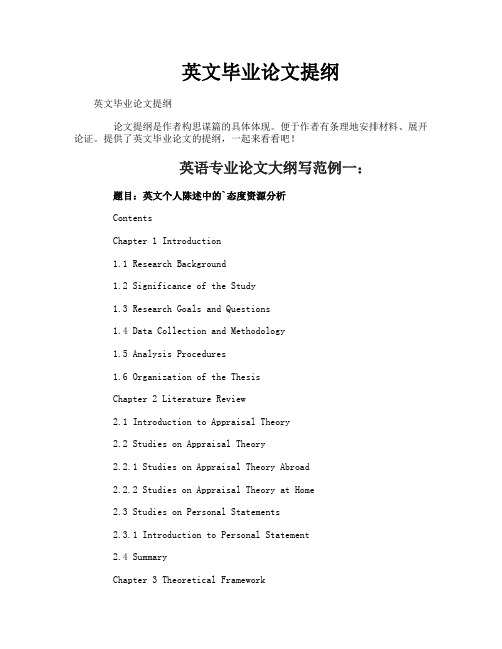
英文毕业论文提纲英文毕业论文提纲论文提纲是作者构思谋篇的具体体现。
便于作者有条理地安排材料、展开论证。
提供了英文毕业论文的提纲,一起来看看吧!英语专业论文大纲写范例一:题目:英文个人陈述中的`态度资源分析ContentsChapter 1 Introduction1.1 Research Background1.2 Significance of the Study1.3 Research Goals and Questions1.4 Data Collection and Methodology1.5 Analysis Procedures1.6 Organization of the ThesisChapter 2 Literature Review2.1 Introduction to Appraisal Theory2.2 Studies on Appraisal Theory2.2.1 Studies on Appraisal Theory Abroad2.2.2 Studies on Appraisal Theory at Home2.3 Studies on Personal Statements2.3.1 Introduction to Personal Statement2.4 SummaryChapter 3 Theoretical Framework3.1 An Overview of Attitude System3.2 Affect Resources3.3 Judgment Resources3.3.1 Social Esteem3.3.2 Social Sanction3.4 Appreciation Resources3.5 Interactions of Affect, Judgment and Appreciation3.6 Borders of Affect, Judgment and Appreciation3.7 SummaryAppendix 1: Papers Published during Graduate StudiesAppendix 2: Some Samples of the StudyReferencesAcknowledgements英语专业论文大纲范例二:题目:归化异化视角下对汉语俗语翻译的比较分析研究-以《三国演义》两个英译本为例CONTENTSChapter One Introduction1.1 Background1.2 Purpose of the Study1.3 Significance and Innovations1.4 Structure of the ThesisChapter Two Literature Review2.1 Domestication and Foreignization2.1.1 Foreignization and Domestication Abroad2.1.2 Foreignization and Domestication in China2.2 Chinese Common Sayings2.2.2 Researches on Chinese Common Saying Abroad2.3 Researches on the English Translation Versions of San Guo Yan Yi2.3.1 San Guo Yan Yi and Its English Translations2.3.2 Previous Study on English Translation Versions of San Guo Yan YiChapter Three Methodology3.1 Research Questions3.2 Data Collection3.3 Research MethodologyForeignization for Moss Roberts and C.H. Brewitt-TaylorChapter Four ConclusionBIBLIOGRAPHYACKNOWLEDGEMENTS。
本科生英语专业毕业论文范文
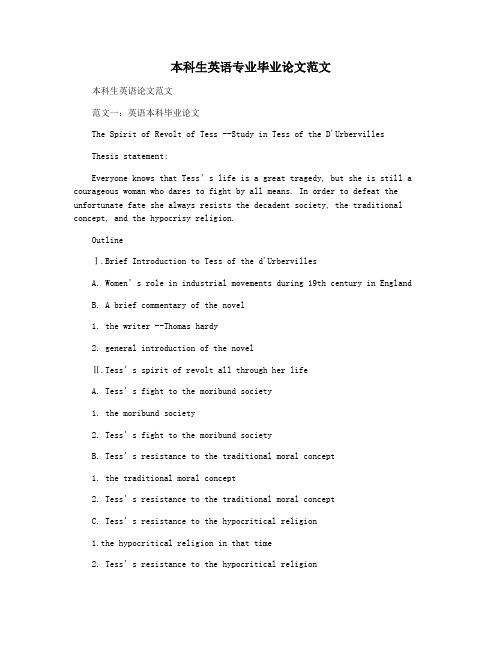
本科生英语专业毕业论文范文本科生英语论文范文范文一:英语本科毕业论文The Spirit of Revolt of Tess --Study in Tess of the D'UrbervillesThesis statement:Everyone knows that Tess’s life is a great tragedy, but she is still a courageous woman who dares to fight by all means. In order to defeat the unfortunate fate she always resists the decadent society, the traditional concept, and the hypocrisy religion.OutlineⅠ.Brief Introduction to Tess of the d'UrbervillesA. Women’s role in industrial movements during 19th century in EnglandB. A brief commentary of the novel1. the writer --Thomas hardy2. general introduction of the novelⅡ.Tess’s spirit of revolt all through her lifeA. Tess’s fight to the moribund society1. the moribund society2. Tess’s fight to the moribund societyB. Tess’s resistance to the traditional moral concept1. the traditional moral concept2. Tess’s resistance to the traditional moral conceptC. Tess’s resistance to the hypocritical religion1.the hypocritical religion in that time2. Tess’s resistance to the hypocritical religionD. Tess’s resistance to the unfort unate marriage1.Tess’s unfortunate marriage2. Tess’s resistance to the unfortunate marriageⅢ.Conclusion: In a word, Tess has shown a powerful woman's image to common people with her unyielding spirit of revolt. She, to the moribund society, traditional old morals, hypocritical religion, capitalist marriage system, has carried on the strongest revealing and criticism. Her kindhearted enlightenment, noble emotion, strong personality, and her resistance inimbuing all rooted in the hearts of the people forever, worth savoring.AbstractThis paper mainly focuses on the spirit of revolt of Tess. First of all, this paper begins with a brief introduction to the novel. Then, this paper makes a brief commentary of the novel. Moreover, it concen trates on :1 Tess’s fight to the moribund society. 2 Tess’s resistance to the traditional moral concept. 3 Tess’s resistance to the hypocritical religion. 4 Tess’sresistance to the unfortunate marriage. And at last the paper reveals thatTess is actually a character with the spirit of revolt all through her life.key of revolt,industrial movement,unfortunate fate内容提要本文研究的是小说主人公“苔丝”的“反抗精神”。
英语专业毕业论文提纲

英语专业毕业论⽂提纲英语专业毕业论⽂提纲 时间过得真快,⼤学⽣活即将结束,我们都知道毕业前要通过毕业论⽂,毕业论⽂是⼀种⽐较重要的`检验⼤学学习成果的形式,毕业论⽂我们应该怎么写呢?下⾯是⼩编精⼼整理的英语专业毕业论⽂提纲,欢迎⼤家借鉴与参考,希望对⼤家有所帮助。
英语专业毕业论⽂提纲篇1 Acknowledgements 4-6 Contents 6-10 List of Figures 10-12 List of Tables 12-20 Abstract 20-22 摘要 23-25 Chapter 1 Introduction 25-32 1.1 Purpose of the study and research questions 28-29 1.2 Significance of the study 29-30 1.3 Organization of the study 30-31 1.4 A note on terminology 31-32 Chapter 2 Literature review 32-51 2.1 T/TP and coherence in English writing 32-35 2.1.1 Defining coherence 32-33 2.1.2 T/TP as means to realize coherence 33-35 2.2 T/TP in EFL/ESL writing 35-42 2.2.1 T/TP and coherence in EFL/ESL writing 35-37 2.2.2 T/TP in EFL/ESL writing as compared to NS writing 37-42 2.3 T/TP in English research articles by EFL/ESL scholars 42-44 2.4 The factors that influence T/TP in EFL/ESL writing 44-47 2.5 Training in T/TP 47-49 2.6 Summary 49-51 Chapter 3 Theoretical background 51-70 3.1 Systemic Functional Grammar 51-55 3.1.1 Five dimensions of language as a semiotic system 51-53 3.1.2 Three metafunctions of language as a functional system 53-54 3.1.3 Three lines of meaning from metafunctions 54-55 3.2 Theme and thematic progression 55-70 3.2.1 Theme 56-62 3.2.2 Thematic progression 62-70 Chapter 4 Research Design 70-88 4.1 The participants and the educational context 70-73 4.1.1 Background of the participants and the participating school 70 4.1.2 The allocation of participants to the training 70-71 4.1.3 The sample sizes 71-72 4.1.4 The pilot study 72-73 4.2 The interventional procedures 73-74 4.3 The questionnaire 74-75 4.4 The training 75-80 4.4.1 Considerations behind the training 75-76 4.4.2 The training material 76-79 4.4.3 The role of the researcher as the trainer 79-80 4.5 Data analysis 80-86 4.5.1 Analysis of the writing 80-86 4.5.2 Analysis of the questionnaire 86 4.6 Ethical considerations 86-88 4.6.1 Informed consent 86-87 4.6.2 Anonymity 87 4.6.3 Harm 87-88 Chapter 5 Results and analysis of pre-training writing 88-115 5.1 Comparison of Themes in EEL pre-training writing and CEL pre-writing 88-102 5.1.1 Topical,textual and interpersonal Themes 88-91 5.1.2 Topical Themes:marked and unmarked Themes 91-95 5.1.3 Textual Themes:continuatives,conjunctions and conjunctive adjuncts 95-100 5.1.4 Interpersonal Themes 100-102 5.2 Comparison of thematic progression in EEL pre-training writing and CEL pre-writing 102-110 5.2.1 Linear,constant,summative and split progressions 102-107 5.2.2 Back,contextual and new Themes 107-110 5.3 Summary 110-115 Chapter 6 Results and analysis of post-training writing 115-137 6.1 Comparison of Themes in EEL post-training writing and CEL post-writing 115-129 6.1.1 Topical,textual and interpersonal Themes 115-117 6.1.2 Topical Themes:marked and unmarked Themes 117-121 6.1.3 Textual Themes:continuatives,conjunctions and conjunctive adjuncts 121-126 6.1.4 Interpersonal Themes 126-129 6.2 Comparison of thematic progression in EEL post-training writing and CEL post-writing 129-132 6.2.1 Linear,constant,summative and split progressions 129-131 6.2.2 Back,contextual and new Themes 131-132 6.3 Summary 132-137 Chapter 7 Results and analysis of pre- and post- training writing 137-155 7.1 Comparison of Themes in pre- and post- training writing 137-147 7.1.1 Topical,textual and interpersonal Themes 137-139 7.1.2 Topical Themes:marked and unmarked Themes 139-142 7.1.3 Textual Themes:continuatives,conjunctions and conjunctive adjuncts 142-145 7.1.4 Interpersonal Themes 145-147 7.2 Comparison of thematic progression in pre- and post- training writing 147-150 7.2.1 Linear,constant,summative and split progressions 147-149 7.2.2 Back,contextual and new Themes 149-150 7.3 Summary 150-155 Chapter 8 Results and analysis of the questionnaire 155-165 8.1 Findings from closed questions 155-160 8.1.1 EEL participants general attitude to training on T/TP 155-157 8.1.2 EEL participants perception of the usefulness of the training on T/TP 157-158 8.1.3 EEL participants perception of the learnability of T/TP 158-159 8.1.4 EEL participants perception of the applicability of T/TP in writing 159-160 8.2 Findings from open questions 160-164 8.2.1 The changes that occurred 161-162 8.2.2 The perceived difficulty of applying the theory of T/TP in writing 162-163 8.2.3 The reasons for the perceived difficulty in learning 163 8.2.4 EEL participants suggestions for future training 163-164 8.3 Summary 164-165 Chapter 9 Discussion 165-195 9.1 Findings with regard to research questions 165-187 9.1.1 Chinese college students use of T/TP in pre-training writing 165-172 9.1.2 Chinese college students use of T/TP in post-training writing 172-181 9.1.3 Effects of the training on T/TP in Chinese college students English writing 181-187 9.2 Positioning the study within the literature 187-190 9.2.1 T/TP in Chinese college students English writing 187-189 9.2.2 Effects of training on Chinese college students use of T/TP 189-190 9.3 Implications 190-194 9.3.1 Pedagogical implication 190-193 9.3.2 Methodological implication 193-194 9.4 Limitations 194-195 Chapter 10 Conclusion 195-200 10.1 Summary 195-197 10.2 Putting everything together 197-199 10.3 Suggestions for future work 199-200 Notes 200-202 References 202-214 Appendix 1: Plan for the interventional procedures 214-215 Appendix 2: The post-training questionnaire 215-217 Appendix 3: Training material 217-229 Appendix 4: Teachers guide to the training 229-237 Appendix 5: Consent form for EEL group 237-238 Appendix 6: Consent form for CEL group 238-239 Appendix 7: Consent form for NS group 239 英语专业毕业论⽂提纲篇2 中⽂摘要 3-4 ABSTRACT 4 Chapter One Introduction 7-10 1.1 Motivation of the present study 7-8 1.2 Significance of this study 8 1.3 Composition of this thesis 8-10 Chapter Two Literature Review 10-19 2.1 Language production 10-14 2.1.1 L1 Production 10-11 2.1.2 L2 Production 11-12 2.1.3 Dimensions of language production 12-14 2.2 Theories on oral output 14-15 2.2.1 Skehan’s dual-model system 14 2.2.2 Swain’s Output Hypothesis 14-15 2.3 Task Repetition 15-17 2.3.1 Task 15-16 2.3.2 Task repetition 16-17 2.4 Relevant studies on effects of task repetition on L2 oral output 17-19 CHARPTER THREE THE CURRENT STUDY 19-25 3.1 Research justification and questions 19 3.2 Hypothesis 19-20 3.3 Methods 20-25 3.3.1 Participants 20-21 3.3.2 Material 21 3.3.3 Research design 21-23 3.3.4 Measures 23-25 Chapter Four Results and Discussion 25-41 4.1 Results and Analysis 25-34 4.1.1 Quantitative analysis 25-27 4.1.2 Qualitative analysis 27-34 4.2 Discussion 34-41 4.2.1 Fluency 34-36 4.2.2 Complexity 36-38 4.2.3 Accuracy 38-39 4.2.4 interlanguage development path of learner L 39-41 Chapter Five Conclusions 41-44 5.1 Conclusion and implication 41-43 5.2 Limitations and recommendations 43-44 Acknowledgements 44-45 References 45-49 Appendixes 49-54 A. Instructions of the experiment 49-50 B. The same-content task 50-51 C. The different-content task 51-52 D. Sample of oral pre-task 52-53 E. Sample of oral post-task 53-54 F. Sample of writing repetition task 54 英语专业毕业论⽂提纲篇3 Abstract 3-4 摘要 5-8 List of Abbreviations 8-9 Chapter One Introduction 9-13 1.1 Research Background 9-11 1.2 Necessity and Objectives of the Study 11-12 1.3 Thesis Organization 12-13 Chapter Two Literature Review 13-27 2.1 Defining Explicit Linguistic Knowledge (ELK) and Implicit Linguistic Knowledge (ILK) 13-16 2.2 Relationship Between Explicit and Implicit Knowledge 16-19。
外国语学院英语专业本科生毕业论文撰写规范
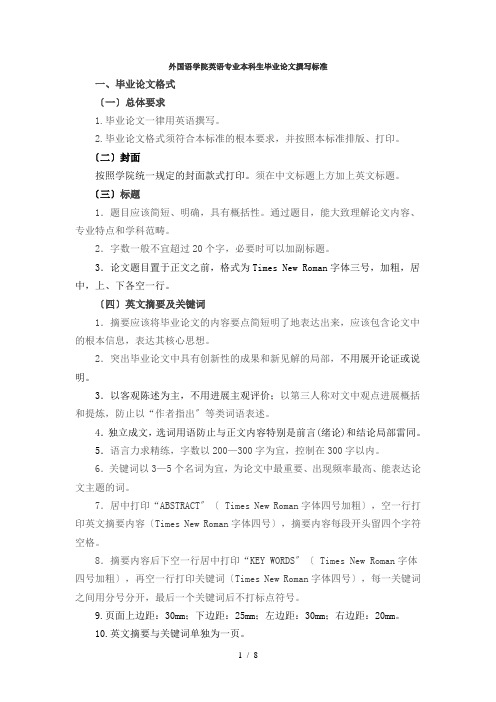
外国语学院英语专业本科生毕业论文撰写标准一、毕业论文格式〔一〕总体要求1.毕业论文一律用英语撰写。
2.毕业论文格式须符合本标准的根本要求,并按照本标准排版、打印。
〔二〕封面按照学院统一规定的封面款式打印。
须在中文标题上方加上英文标题。
〔三〕标题1.题目应该简短、明确,具有概括性。
通过题目,能大致理解论文内容、专业特点和学科范畴。
2.字数一般不宜超过20个字,必要时可以加副标题。
3.论文题目置于正文之前,格式为Times New Roman字体三号,加粗,居中,上、下各空一行。
〔四〕英文摘要及关键词1.摘要应该将毕业论文的内容要点简短明了地表达出来,应该包含论文中的根本信息,表达其核心思想。
2.突出毕业论文中具有创新性的成果和新见解的局部,不用展开论证或说明。
3.以客观陈述为主,不用进展主观评价;以第三人称对文中观点进展概括和提炼,防止以“作者指出〞等类词语表述。
4.独立成文,选词用语防止与正文内容特别是前言(绪论)和结论局部雷同。
5.语言力求精练,字数以200—300字为宜,控制在300字以内。
6.关键词以3—5个名词为宜,为论文中最重要、出现频率最高、能表达论文主题的词。
7.居中打印“ABSTRACT〞〔 Times New Roman字体四号加粗〕,空一行打印英文摘要内容〔Times New Roman字体四号〕,摘要内容每段开头留四个字符空格。
8.摘要内容后下空一行居中打印“KEY WORDS〞〔 Times New Roman字体四号加粗〕,再空一行打印关键词〔Times New Roman字体四号〕,每一关键词之间用分号分开,最后一个关键词后不打标点符号。
9.页面上边距:30mm;下边距:25mm;左边距:30mm;右边距:20mm。
10.英文摘要与关键词单独为一页。
〔五〕中文摘要及关键词1.中文摘要内容应与英文摘要根本相对应,语句通顺,文字流畅。
2.中文关键词与英文关键词应根本对应。
英语专业毕业论文提纲范文

英语专业毕业论文提纲范文精选英语专业毕业论文提纲怎么写?下面是为大家的英语专业毕业论文提纲精选,欢送参考~Why should we write the thesis?To write a thesis before graduation is a must for every university graduate.By writing a thesis, we may get some experience and some basic methods for further theoretical study and research and the ability to solve problems.It is the reflection of a student s study in college.Whether a student has such an ability to write a thesis or to solve problems in his/her field is one basis for a unit to aept him/her or not.How long should we prepare for writing a thesis?One year or soWhat do we need when we write a thesis?Firstly, for English major, most important of all, it is English knowledge and ability that based on your language skills, especially writing skill and grammar knowledge.Secondly, the way of writing is also important.A good title, some good ideas to support thesis statement, right language and standard format are what we need.The language style is something that we should pay much attention to, for example:Wording: we prefer big word to small one;Sentence: Long sentences are quite expectable.How do we write a thesis? How many steps should we follow?Generally speaking, when we write a thesis, we follow1steps:Choose a subject: that is, what you are going to write about. For English major, we may apply:Choose a title/Title a paper;Collect materials for reference in writing;Analyze the collected materials;Sort out the data and arguments;List references;Make up an outline;drafts;Proofread;The last version.What subjects may we choose to write?English and American LiteratureThe Practice and Theory of TranslationEnglish LanguageEnglish LinguisticsEnglish GrammarEnglish PhoicsEnglish LexicologyEnglish RhetoricLanguage and CultureELT MethodologyTeaching English in Middle School English Teaching Research and Survey The History of (All mentioned above)。
英语专业毕业论文写作大纲
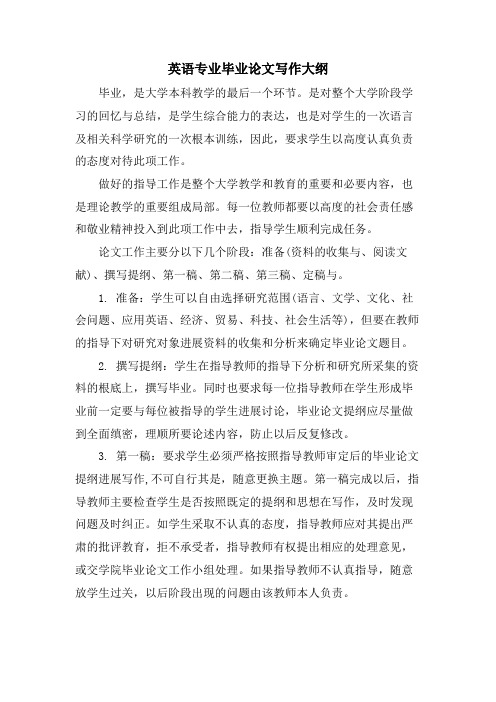
英语专业毕业论文写作大纲毕业,是大学本科教学的最后一个环节。
是对整个大学阶段学习的回忆与总结,是学生综合能力的表达,也是对学生的一次语言及相关科学研究的一次根本训练,因此,要求学生以高度认真负责的态度对待此项工作。
做好的指导工作是整个大学教学和教育的重要和必要内容,也是理论教学的重要组成局部。
每一位教师都要以高度的社会责任感和敬业精神投入到此项工作中去,指导学生顺利完成任务。
论文工作主要分以下几个阶段:准备(资料的收集与、阅读文献)、撰写提纲、第一稿、第二稿、第三稿、定稿与。
1. 准备:学生可以自由选择研究范围(语言、文学、文化、社会问题、应用英语、经济、贸易、科技、社会生活等),但要在教师的指导下对研究对象进展资料的收集和分析来确定毕业论文题目。
2. 撰写提纲:学生在指导教师的指导下分析和研究所采集的资料的根底上,撰写毕业。
同时也要求每一位指导教师在学生形成毕业前一定要与每位被指导的学生进展讨论,毕业论文提纲应尽量做到全面缜密,理顺所要论述内容,防止以后反复修改。
3. 第一稿:要求学生必须严格按照指导教师审定后的毕业论文提纲进展写作,不可自行其是,随意更换主题。
第一稿完成以后,指导教师主要检查学生是否按照既定的提纲和思想在写作,及时发现问题及时纠正。
如学生采取不认真的态度,指导教师应对其提出严肃的批评教育,拒不承受者,指导教师有权提出相应的处理意见,或交学院毕业论文工作小组处理。
如果指导教师不认真指导,随意放学生过关,以后阶段出现的问题由该教师本人负责。
4. 第二稿:要求学生不仅要继续补充第一稿之缺乏,同时要求在表达上要有所提高。
在接到第二稿以后,指导教师阅读后应指出存在的问题,以便学生及时改正。
5.第三稿:要求学生在文风、文章格式、修辞等方面有所提高。
指导教师要对第三稿进展全面的审阅,并提出修改意见,以保证定稿打印时所有的错误和疏漏都得到更正,错误率控制在规定范围内。
同时,教师还要提醒学生在打印前再校对,以保证尽可能地将正确的版本打印出来。
- 1、下载文档前请自行甄别文档内容的完整性,平台不提供额外的编辑、内容补充、找答案等附加服务。
- 2、"仅部分预览"的文档,不可在线预览部分如存在完整性等问题,可反馈申请退款(可完整预览的文档不适用该条件!)。
- 3、如文档侵犯您的权益,请联系客服反馈,我们会尽快为您处理(人工客服工作时间:9:00-18:30)。
英语专业毕业论文提纲AcknowledgementsAbstract (English)Abstract (Chinese)IntroductionChapter 1 Moby-Dick and Individuation Theory1.1 Background of Herman Melville and Moby-Dick1.2 Brief Introduction of C.G. Jung’s Individuation TheoryChapter 2 Failed Individuation of Captain Ahab2.1 Ahab’s Wounded Pride2.2 Ahab’s Madness2.3 Failed Individuation of AhabChapter 3 Individuation of Ishmael3.1 Alienated Ishmael in the very Beginning3.2 Tendency of Ishmael’s Ego-Self Reunification3.3 Individuation Process of Ishmael3.4 Differences between Ishmael and AhabConclusionWorks Cited英语专业毕业论文写作资料查询网址1. 中国期刊网:入清华同方CNKI和万方数据资源2. 中国国家图书馆:3. 清华大学图书馆:4. 北京大学图书馆:5. 北京师范大学图书馆:6. 南京大学图书馆:7. 复旦大学图书馆:8. 北京外国语大学图书馆:9. 厦门大学图书馆:10. 广东外语外贸大学图书馆:11. 美国国会图书馆:12. 英国外语辅助教学图书馆13. 美国世界图书馆网络中心:14. 人文科学在线杂志图书馆:15. 中国在线图书馆:16. OCLC联机计算机图书馆中心:17. 语言文学在线资源库(Online MLA International Bibliography):18. 英语和外语教学在线杂志:19. “美国研究”网页:20. ERIC英语教学文摘档案库:21. 美国ISI公司Arts and Humanities Citation Index (A & HCI)-1975-present:22. 美国ISI公司Social Science Citation Index (SSCI)-1975-present:23. Uncover期刊论文原文传递服务系统24. 美国Brown大学语言学虚拟图书馆:25. 英国London大学Berkbeck学院应用语言学图书馆:26. 美国ERIC(教育?源信息中心)语言与语言学资料交换中心:国内外外语与外语教学类网址1. Applied linguistics virtual library:2. Human language page:3. Linguistic resources on the Internet:4. Universal survey of language:5. 中国基础教育网:6. 中国英语教师网:7. 美国全球英语学习网:英语专业毕业论文参考书目语言类:1.湖南教育出版社出版的《语言学系列教材》(共11部)2.上海外语教育出版社出版的《现代语言学丛书》(15种)3.李延福主编,英语语言学基础读本,山东大学出版社,19994.胡壮麟等,语言学教程,山东大学出版社,19895.刘润清,西方语言学流派,外语教学与研究出版社,19996.当代国外语言学与应用语言学文库,2000,剑桥大学出版社7.刘润清等,现代语言学名著选读(上下册),测绘出版社,19888.黄永安主编,新编大学英语语法,华中理工大学出版社,19979.张道真,实用英语语法,商务印书馆10.章振邦,新编英语语法教程,上海外语教育出版社11.陆国强,现代英语词汇学,上海外语教育出版社12.王佐良等,UGG boots clearance,英语文体学引论,外语教学与研究出版社13.冯翠华,英语修辞大全,商务印书馆14.黄任,英语修辞与写作,上海外语教育出版社15.谢祖钧,英语修辞,机械工业出版社16.文军,英语修辞格词典,重庆大学出版社17.覃先美,英语修辞学――理论与实践,台湾万人出版社18.Partrick Hartwell, Open to Language---A New College Rhetoric, Oxford University Press19.Winfield Goong, Rhetoric in Practice,香港图书公司20.Randolph Quirk et al, A Grammar of Contemporary English (1972)21.Leech, Geoffey and Svartvik, Jan, A Communicative Grammar of English (Longman)期刊:《外语教学与研究》、《外国语》、《现代汉语》、《当代语言学》等。
文学类1.刘炳善,英国文学史,上海外语教育出版社2.Elizabeth B. Booz, A Brief Introduction to English Literature, 上海外语教育出版社3.Highlights of American Literature, Books Ⅰ---Ⅳ, 上海译文出版社4.Elizabeth Booz, 现代美国文学简介5.范存忠主编,英国文学史纲,四川人民出版社6.董衡巽等,美国文学简史,人民文学出版社7.孙凤城等,Discount UGG boots,现代欧美文学,北京师范大学出版社8.杨岂深主编,英国文学选读(1-3册),上海译文出版社9.陈嘉,Selected Readings in English Literature(1-3册)10.王佐良等,美国短篇小说选,商务印书馆11.Marcus Canlift, The Literature of the United States12.Norton Anthology of English Literature13.Norton Anthology of American Literature14.阿尼克斯特,英国文学史纲,人民文学出版社期刊:《外国文学评论》、《外国文学研究》、《中国比较文学》、《世界文学》、《外国文艺》等翻译类1.张培基等,英汉翻译教程,上海外语教育出版社2.陈廷佑,英文汉译技巧,外语教学与研究出版社3.吕瑞昌等,汉英翻译教程,陕西人民出版社4.张梅岗,实用翻译教程,湖北科技出版社,19925.罗新璋,翻译论集,商务印书馆,19846.刘宓庆,文体与翻译,中国对外翻译出版公司,19907.刘宓庆,现代翻译理论,江西教育出版社,19908.刘宓庆,汉英对比研究与翻译,江西教育出版社,19919.刘重德,浑金璞玉集,中国对外翻译出版公司,199410.刘重德,文学翻译十讲,中国对外翻译出版公司,199411.张今,文学翻译原理,河南大学出版社,198712.许钧,文学翻译批评研究,南京出版社,199213.萧立明,翻译新探,台北书林出版有限公司14.毛荣贵,英译汉技巧新编,外文出版社,200115.范武邱,实用科技英语翻译讲评,外文出版社,200116.Catford, J. C. 1965, A Linguistic Theory of Translation, An Essay in Applied Linguistics, London:Oxford University Press17.Jin, Di & Nida, Eugene A. On Translation, Beijing: China Translation and Publishing Corporation, 198418.Nida, Eugene A. Toward a Science of Translating, Leiden: E.J. Brill, 196419.Newmark, Peter, A Textbook of Translation, London: Pergamon Press, 198820.期刊:《中国翻译》、《中国科技翻译》、《上海科技翻译》、《外语与翻译》等英语专业毕业论文摘要常用语句Abstract1. This paper (article,UGGs, thesis) presents (shows, expresses)…本文提出……2. This paper (article) holds (deems)…本文认为……3. This paper (article) discusses (studies, concerns, deals with, tells of)…本文讨论(研究)……4. This paper (article) introduces (reports, explains, analyses, emphasizes, summarizes)…本文介绍(报告、解释、分析、强调、总结)……5. This paper (article) argues (demonstrates)…本文论述(论证)……6. This paper (article) explores (probes into)…本文探讨……7. This paper (article) elaborates on (expounds)…本文详述(阐明)……8. This paper includes (covers, touches on)…本文包括(涉及)……9. This paper aims to (aims at)…本文旨在……10. This paper focuses on…本文集中研究……11. This paper tries (attempts) to (make an attempt to)…本文试图……12. This paper makes a comparison of (makes a tentative study, makes a brief introduction to)…本文对……作了比较(作了尝试性研究,作了简介)……13. This paper offers (give s) a discussion of (an overview of, an analysis of)…本文探讨(综述、分析)……14. This paper develops the theory of…本文发展了……理论……15. This paper considers (deems) in necessary (available) to…本文认为……是必要的(有用的)……16. This paper is about (related to)…本文对……进行研究17. This paper is a criticism of the theory of…本文对……理论提出质疑(批评)…..18. This paper is presented as a counterargument of the paper by…本文是对……一文的质疑19. This paper, on the basis of…reveals (illustrates)…本文在……基础上揭示(例证)……20. Based on…this paper first categorizes…and then tentatively sets out…本文以……为出发点,先对……进行分类,然后提出……21. Centering round…this paper is intended to explore (probe into)…本文围绕……试图探讨……22. …is (are), in this paper, referred to as…of which an analysis of …is made…本文把……看做…….并对其进行……分析23. …is (are), touched (studied) as well in this paper…本文还论及(研究)……24. The purpose (objective) of this paper is to review…本文的目的是评论……25. The author (writer) of this paper holds (considers, deems, contends)…本文作者认为……26. The author (writer) tries to g ive an account of…作者试图说明……27. In this paper, the author (writer) suggests (proposes)…作者在这篇文章里建议……28. In this paper, we point out (emphasize, argue)…在这篇文章里,我们指出(强调)……29. It is pointed out (deemed)…文章指出(认为)……30. An analysis is given about…本文集中分析……31. In light of …theory, discussion is made about…本文从……的理论出发,讨论……。
